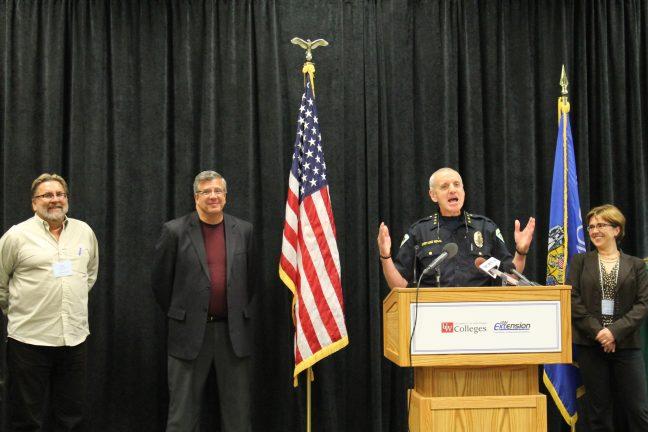In an effort to curb the growing opioid epidemic in Wisconsin, the Madison Police Department Thursday announced a new initiative aimed at providing treatment for non-violent offenders who suffer from addiction.
MPD, state elected and public health officials held a news conference at the Pyle Center Thursday afternoon to announce a three-year pilot program called the Madison Addiction Recovery Initiative.
“Today, we get to report a true win for the community,” MPD Chief Mike Koval said. “This is one happy and gratified police chief who for the first time in years can say ‘I feel like we can truly make a difference.'”
Funded through a $700,000 Smart Policing grant from the U.S. Department of Justice, MARI will provide substance abusers the ability to get treatment rather than become ensnared in the criminal justice system when faced with a potential arrest. The grant money will fund the positions for a program coordinator, counselors and peer mentor coaches, MPD spokesperson Joel DeSpain said.
When officers encounter a heroin overdose or a non-violent crime that is related to addiction, they will now offer the user the opportunity to seek treatment, Lt. Cory Nelson said. The option to seek treatment will not apply to violent crimes.
MPD will hold the charges for the offender’s crime up to a year, Nelson said. If they commit another crime during their stay in the program, they will be removed and will face arrest, he added.
MPD and state elected officials praised the effort to focus on treating substance abusers rather than incarcerating them.
“We cannot simply arrest our way out of this epidemic,” Rep. John Nygren, R-Marinette, said.

Koval added that labeling and stigmatizing an arrest record isn’t going to get addicts the extensive treatment required to allow them to move forward with their lives.
The news conference at the Pyle Center coincided with the
annual Wisconsin Society of Addiction Medicine conference. At last year’s conference, Aleksandra Zgierska, an assistant professor in the University of Wisconsin School of Medicine, realized there was a gap that needed to be filled.
For addicts to receive help, whether in the streets or clinics, Zgierska said it was necessary to bring collaborators across a variety of fields to address the problem together.
Use of heroin anti-overdose medication increased 300 percent in last year
“We should not punish [users],” Zgierska said. “We now know addiction is a disease just like any other, like diabetes or hypertension, and we should apply the same standards that are there for other chronic conditions.”
With the help of other UW clinicians and researchers, Zgierksa said she and her team will evaluate the initiative in real-time and provide ongoing research and feedback to improve the program.
Some of the local addiction programs that have partnered with MARI include UW Behavioral Health and Recovery, ARC Community Services and NewStart and Connections Counseling among others.
The program is scheduled to begin in January 2017.


